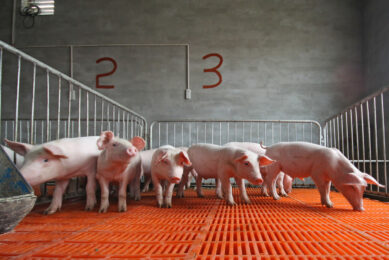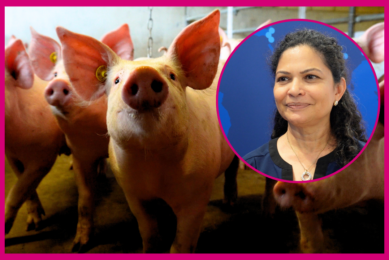Swine health impact on human foodborne risk
A study has been carried out to measure the relationship between lesions suggestive of subclinical pig illness at harvest to carcass contamination and human foodborne risk.
Over the course of eight visits between December 2005 and January 2006, 280 randomly selected carcasses were swabbed, during normal slaughter operations, at three points in the slaughter line: skin pre-scald; the bung or pelvic cavity following removal of the distal colon and rectum; and pleural cavity, immediately before the final carcass rinse.
Each swab sponge was used on five carcasses in bung and pleural cavity sampling. Swab sponges were cultured quantitatively for Campylobacter spp., Enterococcus spp., and Enterobacteriaceae spp., and qualitatively for Salmonella spp. Data on health indicators were collected for all pigs in the study (2,625 pigs) by experienced plant quality assurance personnel.
Campylobacter spp. were recovered from the pleural cavity in 58.9% (33/56) of pools (five carcasses/pool), and in 44.6% (25/56) of pools from the bung cavity. Enterococcus spp. were recovered from 66.1% (37/56) and 35.7% (20/56) of pleural and bung pools, respectively.
The most common lesion identified was the peel-out (pleuritis or adhesions), with a total of 7.1% (186/2,625 total head). Linear regression showed that for every percentage point increase in peel-outs, Enterococcus spp. contamination increased by 4.4% and Campylobacter spp. increased by 5.1% (p<0.05).
This study showed a correlation between animal health and human health risk, as measured by carcass contamination. Therefore, animal management decisions on-farm, such as housing, antibiotic use, environment, and level of veterinary care, may directly impact public health.
Source: AASV
Related Website
• American Association of Swine Veterinarians
Click here for the free Pig Progress newsletter
The most common lesion identified was the peel-out (pleuritis or adhesions), with a total of 7.1% (186/2,625 total head). Linear regression showed that for every percentage point increase in peel-outs, Enterococcus spp. contamination increased by 4.4% and Campylobacter spp. increased by 5.1% (p<0.05).
This study showed a correlation between animal health and human health risk, as measured by carcass contamination. Therefore, animal management decisions on-farm, such as housing, antibiotic use, environment, and level of veterinary care, may directly impact public health.
Source: AASV
Related Website
• American Association of Swine Veterinarians
Click here for the free Pig Progress newsletter











